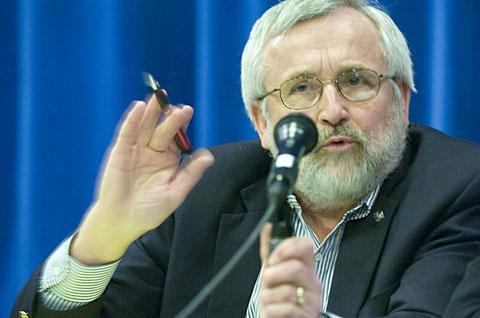With the subject of accountability on the table, Accountability Comes to Town absent
Jim Burbidge, representing the group Federal Way Works, drives home his point during the January 16 debate at the Federal Way High School Little Theater. Federal Way Works seeks to maintain the current city manager-council form, and his side argues that changing to a strong-mayor system runs the risk of introducing expensive, boss-style politics into Federal Way's government. Proponents of the change touted increased accountability of the strong-mayor system.<br><br><b>Photo and video by Seth Bynum</b><br><br>//
Thu, 01/17/2008
Federal Way's form of government, now in place for nearly 18 years, faces its first significant challenge from a group of vocal citizens who want to reshape the city's political infrastructure.
The philosophical and political battle that appears to gain momentum and intensity clashed in a public forum Wednesday, January 16, as both sides of issue presented their case to a divided audience and a seemingly objective panel of moderators.
And with Federal Way voters heading to polls February 19, the 90-minute debate saturated the audience with enough information-both groups hope-to sway the fence-sitters to their side.
Stage left sat advocates for change, Frosty and Galya Hardison, representing the "yes" vote for a new strong mayor/council form of government.
Across the aisle, Jim Burbidge and Jerry Vaughn advocated to retain the current city manager-council form of government.
Vaughn, a small business owner in Federal Way and resident since 1990, and Burbidge, a retired dentist who has lived in the Federal Way School District since 1968, represented Federal Way Works, an eclectic group of citizens-from politicians to business owners-who believe the city's political structure has more than proven itself effective.
Absent from the debate was ACT, or Accountability Comes to Town, the organization that supports an elected mayor and succeeded in gathering enough signatures to get their position on the ballot.
Galya, who ran her own unsuccessful campaign to unseat councilmember Jeanne Burbidge in 2005, and Frosty, known locally for his email that prompted the School Board's widely unpopular moratorium on the classroom showings of Al Gore's "An Inconvenient Truth," told the audience that they did not represent ACT.
The Hardison's announcement caused a murmur of confusion in the audience of nearly 100 at Wednesday night's debate. A June 2006 press release issued to the Federal Way News from Gayla Hardison indicated she held the role of spokesperson for ACT.
Regardless of their affiliations, the pro side quickly outlined their position, which focused primarily on increasing accessibility and accountability in Federal Way's government.
"This is going to be just like the Lincoln-Douglas debate," Frosty said. "We're not going to talk your ear off for a full three minutes, we're going to give you the straight and honest facts."
The Hardisons trimmed their argument down to three main issues, "Your voice being heard, the choice you can possibly make, and more government accountability," Frosty said.
The Hardisons cited their continuing difficulty in gaining an audience with the seven-member city council, a lack of political freedom in electing their own leaders, and the expense of running what they called a bureaucratic "Hydra" of seven elected councilmembers, with a city manager whose performance is not subjected to direct public scrutiny.
The strong-mayor team argued that a single elected leader would allow the city government to operate more smoothly and efficiently, streamlining bureaucracy and increasing the productivity paid for in tax dollars.
He drew a parallel to current prices for gasoline.
"Do you know why you're paying $3 for a gallon of gas," Frosty asked, rhetorically, "Because we have refineries that are 30 friggin' years old that work."
"We need more of them," he said, "That's why you're paying high gas prices, and that's why they want the status quo."
"Sure it works," Frosty said, referring to both oil refineries and Federal Way's current form of government, "but at what cost?"
"Everybody realizes change needs to occur," Frosty said, "and you're not going to get it by keeping the status quo."
Naturally, the Federal Way Works camp contended this point.
"If it ain't broke, don't fix it," Burbidge said, a clich


